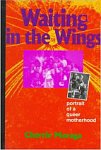Waiting in the Wings: Portrait of a Gay Motherhood
reviewed by Judith E. Beckett, R.N.

by Cherrie Moraga
Firebrand Books, 1997.
Cherrie Moraga is an acclaimed Chicana author and playwright. She wrote Loving in the War Years and co-edited the landmark collection The Bridge Called My Back. She is also a butch woman who believed, until recently, that “lesbians weren’t really women. We were women lovers; a kind of third sex.” But when she was forty years old she realized that there was someone “waiting in the wings”, calling to her to “make a baby from scratch.”
She told her partner Ella and then Pedro, a gay male friend, “I’m going to do this. Will you help me?” And she became pregnant with the first insemination. She describes it as “the best loving I’ve ever known.”
There are some concerns with this pregnancy from early on: fibroids, a rash, allergies, some vaginal bleeding. Through genetic testing, they learn the baby will be a boy and she and Ella are both “profoundly shaken”. When the rumor is confirmed that a friend of theirs has been diagnosed with AIDS, however, Moraga concludes: “There is meaning in the fact that my fetus has formed itself into a male, a meaning I must extract from this… era of dying into which my baby will be born.” She concludes, “Es el destino”.
At twenty-seven weeks, her water breaks while she is visiting her home in LA. Rafael Angel is born soon after. He weighs two pounds, six ounces and spends the next three months in an incubator struggling to survive two major surgeries and several infections.
“How does one have faith when one is consumed by fear?” Moraga asks as she pours breast milk into her garden as an offering for his survival.
And though she and Ella are half crazed with fear and worry, when they come to the hospital at night, they must still contend with the security guards (“testosterone-driven homophobes with no power acting like they got some”) who sign them in. Again and again, they are confronted and questioned about Ella’s role in the infant’s life.
And when Ella calls the nursery to inquire about Rafael’s condition and the nurse doesn’t hear a male voice, she is always asked, “Who are you?” “Read the damn chart!” she snaps back one morning.
Rafael finally does come home. His presence changes everything. Moraga describes sleep deprivation as a physical state, near madness. One night she says, “I throw a futon on the floor of Rafael’s room, cover it with flannel sheets and a down comforter, stick the kid inside, and we sleep like odd-sized twins together. I throw the tit at his every stirring…”
The effect on the couple’s relationship is explosive. They must meet the needs of this new and demanding family member while exploring Ella’s role as the non-biological mother (“cold Anglo word”) and redefining their own relationship: “The growing presence of Rafael in our lives filled up the space that was once reserved for ourselves together and apart.”
There are many complications that can result from the simple desire to “make a baby from scratch”. They are discussed in mainstream books on pregnancy, childbirth and mothering. But this is a book for queer families. It’s the story of a baby parented by two lesbians and a gay man whose roles as parents have not yet been defined by gay or straight society. Issues of ethnicity (Ella is Irish American), cultural differences, politics, and homophobia challenge them as well.
Waiting in the Wings is beautifully written, an artist’s journal, a “poetic memoir” in Moraga’s words. Her words flow from English to Spanish and back again just as they would if she were talking to us. Written during the age of death/the age of AIDS, it is a profound meditation on motherhood and family relationships, hope and faith, life and death. This book is indeed a kind of poet’s memoir, for even giving birth does not satisfy the artist’s hunger to create.
Information published on The Rainbow Babies website is not a substitute for proper medical advice, diagnosis, treatment or care. Always seek the advice of a physician or other qualified health providers with any questions you may have regarding a medical condition.
Disclaimer: The Rainbow Babies provides sample contracts and legal/social health articles for informational purposes only—please do not consider it as legally-binding advice of any kind.


